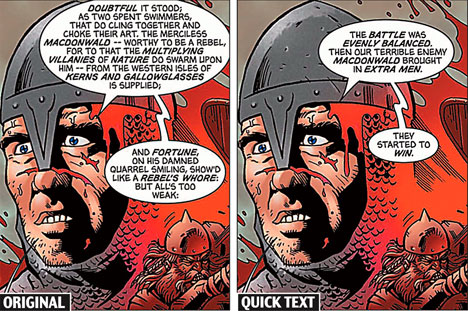So, this article has been getting a lot of attention on the Internet, and I feel I need to respond:
In a radio programme to be aired today, Scots historian Fiona Watson and literary expert Molly Rourke claim the story of Macbeth was penned by a Scottish monk on St Serf’s Island in the middle of Loch Leven 400 years before William Shakespeare even drew breath.
Pause for laughter.
In Macbeth the Highland King to be broadcast on BBC Radio Scotland, Watson says Macbeth and his wife, Gruoch, were in fact “respected, God-fearing folk”.
According to Watson, the “almost entirely fantastical view” of Macbeth and Lady Macbeth drawn by William Shakespeare is lifted, almost word for word in places, from a collection of folklore recorded by St Serf’s monk, Andrew de Wyntoun.
Wow, there’s so much wrong with that, it’s hard to know where to start.
First of all, the “almost word for word” case is never made, at least not in the article. The few points of similarity between the two texts that are mentioned are dealt with below. But there really was a historical Macbeth, and so any two accounts of his life are bound to have some similarities, whether they be historical or legendary.
Did Shakespeare have an “almost entirely fantastical view” of Macbeth? Yes. He was a playwright, not a historian. He often made changes to history to suit his dramatic purposes. That’s what he’s supposed to do. He was also writing for King James, who was a direct descendant of both Malcolm and Banquo. So of course he’s going to make them good and noble and make Macbeth a savage butcher. He knew which side of his bread was buttered.
Also, the Andrew Wyntoun text is from 1420. How is that “400 years before William Shakespeare even drew breath” which he first did in 1564? And if the text really were from 1164, it would not be at all readable to a twenty-first century English-only speaker, as this text somewhat is. Check it out.
But the most striking part of the article is that it completely ignores the fact that we already know what Shakespeare’s source was for the events described. It was Raphael Holinshed’s The Chronicles of England, Scotland, and Ireland. In fact, not only was Holinshed’s Chronicles a major source for Macbeth, but also for King Lear, Cymbeline, and all ten of Shakespeare’s history plays. If you don’t know that, it’s easy to be taken in by the following observation in the article:
Referring to Shakespeare’s prophecy that Macbeth shall be safe until Birnham Wood comes to Dunsinane and that no-one “of woman born” shall harm Macbeth, Rourke explained in Wyntoun’s work: “The person [Macbeth’s mother] met later came and saw her, gave her a ring, and prophesied about what was going to happen in the future. One of the things he said was that this child they’d had would never be killed by man born of woman. Wyntoun also recorded that Macbeth believed he’d never be conquered until the wood of Birnham came to Dunsinane.”
Thanks to the wonderful Furness Collection at the University of Pennsylvania, we can see the source for this on Page 174 of the Historie of Scotland section of Holinshed’s Chronicles:
And suerlie herevpon had he put Makduffe to death, but that a certaine witch, whom hee had in great trust, had told that he should neuer be slaine with man borne of anie woman, nor vanquished till the wood of Bernane came to the castell of Dunsinane.
The witch told Macbeth, like the apparitions do in the play, not a person telling Macbeth’s mother and giving her a ring.
The article continues on with reckless abandon:
The historians claim another element of Wyntoun found in Shakespeare is the three witches that open the play. Wyntoun wrote: “Ane nicht, he thoucht while he was sa settled [that] he saw three women, and they women then thoucht he three Wierd Sisters most like to be.
“The first he heard say, ganging by, ‘lo, yonder the Thane of Cromarty’.
“T’other woman said again ‘of Moray, yonder I see the Thane’.
“The third said ‘yonder I see the king’.”
Rourke and Watson say the resemblance to the witches’ prophesy in Shakespeare’s Macbeth – in which the first hails him as “Thane of Glames”, the second as “Thane of Cawdor” and the third proclaims he shall “be King hereafter” – is too great to be co-incidental.
We simply need to turn back to page 170 of Holinshed to see where Shakespeare found this, and thanks to the extraordinary Folger collection we can see a much easier-to-read copy of Holinshed’s version of the story:
Shortlie after happened a strange and vncouth woonder, which afterward was the cause of much trouble in the realme of Scotland as ye shall after heare. It fortuned as Makbeth and Banquho iournied towards Fores, where the king then laie, they went sporting by the waie togither without other company saue onelie themselues, passing thorough the woods and fields, when suddenlie in the middest of a laund, there met them three women in strange and wild apparell, resembling creatures of elder world, whome when they attentiuelie beheld, woondering much at the sight, the first of them spake and said: All haile Makbeth, thane of Glammis (for he had latelie entered into that dignitie and office by the death of his father Sinell). The second of them said: Haile Makbeth thane of Cawder. But the third said: All haile Makbeth that heereafter shalt be king of Scotland.
I’ll allow you to examine that scene in Shakespeare and decide for yourself which of these two accounts was most likely Shakespeare’s source.
It’s entirely possible that Wyntoun’s work was a source for Holinshed (or Harrison, Leland, etc.), or a source of a source, or at some point they had a common source. But the idea suggested by this article, that Shakespeare somehow “lifted” Macbeth from Wyntoun, is absurd.
UPDATE: A follow-up post.

